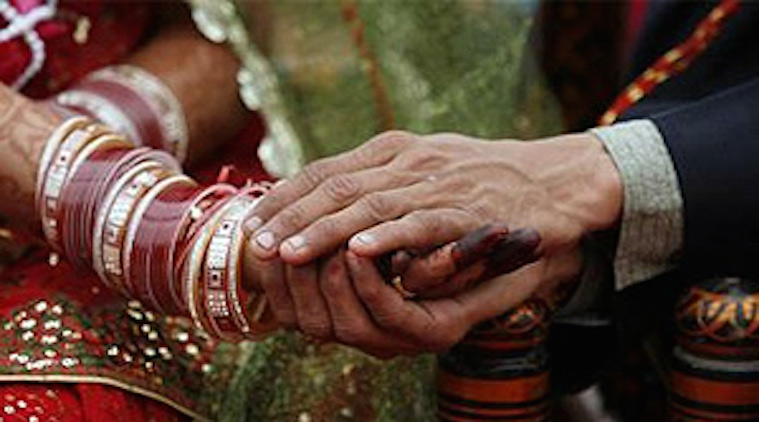 The SC judgment upholds choice and consent of adults for marriages and clarifies that the consent of family is not needed. (File)
The SC judgment upholds choice and consent of adults for marriages and clarifies that the consent of family is not needed. (File)
The Supreme Court recently delivered a scathing attack on ‘honour killings’, which have been long outlawed but continue unabated. The judgment gives a strong stepwise plan to combat the evil. The court also took a stand against khap panchayats, the contemporary dispenser of such barbarism, usually targeting inter-caste and inter-religious marriages.
The judgment states that “the human rights of a daughter, brother, sister or son are not mortgaged to the so-called or so-understood honour of the family or clan or the collective.” The judgment upholds choice and consent of adults for marriages and clarifies that the consent of family is not needed. It is contextualised with inalienable right to life under Article 21 of the Constitution, and its vital corollary, the right to choose and the right to live with dignity.
To put the plan into practice the Bench came forward with several directions. For instance, the state must identify districts and villages that have witnessed honour killings in the near past and a DSP rank officer must persuade members of khap not to convene such meetings. If such meetings do take place then video recordings must be done. In the case of threat to life of a couple, the police can invoke Section 144. In case a diktat is passed against the couple, the police must register an FIR and take immediate steps to give security to the couple, which may include putting them in a safe house under police protection.
Moreover, the Bench urged for proactive and positive action from the local administration that should give logistical support for solemnising the marriage. Some punitive measures include, constitution of a special cell with a 24-hour helpline to deal with cases of threat and to register complaints. Another direction includes hearing on a day-to-day basis, and conclusion within six months of cases of honour killing.
These are all laudable directions, but one can question why these measures were not already in place. Of course, effective implementation remains another matter.
There are no authentic figures for honour killings in India, although minister of state for home affairs Hansraj Gangaram Ahir told the Lok Sabha in August 2017, that 288 cases had been recorded between 2014-2016. It seems these figures are underestimated, especially in rural northern India. Victims are overwhelmingly women, even though men associated with perceived transgressions can be punished as well. Sometime women are even punished for supposed indiscretions of other members of family or even community.
Human Rights Watch defines ‘honour killings’ as acts of vengeance, usually death committed by male members against female members of society. She can be targeted for a variety of reasons, including refusing to enter into an arranged marriage, being the victim of sexual assault, seeking a divorce – even from an abusive husband or alleged adultery.
Thus ‘honour killings’ have a fundamentally patriarchal context. Unequal power relations, in the context of honour manifest by holding male members of the society or community as its custodian, who become purveyors of punishment for transgressions. The female members, on the other hand, are to carry the burden of this honour, at the cost of their self, freedom, agency and even life. This can present itself in forms of various controls over a woman’s behaviour, sexuality and marriage and at worst honour killings in case of perceived lapses.
The concept of honour consequently has become problematic due to increasing recognition of its precarious nature, its resultant hegemony and exclusionary tactics, and its overwhelming bias against women. In this respect, jauhar or self-immolation by women, ostensibly to hold the clan’s honour can be seen as another manifestation of this phenomenon.
When many recently spoke against the glorification of jauhar in Padmaavat, they were attacked for interfering with artistic liberties, often by people who were silent on the attacks by the Karni Sena. The crucial problem here was not about presenting a historical issue, but presenting something extremely problematic without nuance, distance or complexity. Killing women, or driving them to suicide, will remain unambiguously criminal. Yet the society and law continues to fall short of univocal condemnation of khaps and their punishment.
It must be noted that khap panchayats often enjoy support not just from local community and leaders but also from leaders in state and national parties. Delhi Chief Minister Arvind Kejriwal had once stated that these khaps serve a “cultural purpose” and he did not see the need for a ban. Haryana Chief Minister Jagdish Khattar also recently came in support of khaps saying they act as the “custodian of our social customs” and that they play an important role in maintaining brotherhood and grievance redressal. If the SC’s judgment is to be effective it must take into account this nexus and the considerable local political power of khaps.
However, if preventive and punitive actions are properly implemented, they can go a long way in protecting women, upholding freedom of choice and even dismantling caste barriers. Love marriages across caste and class divides, have substantial subversive potential in rigid and conservative patriarchal societies and must be protected, primarily for the sake of lovers, but sometimes also for the sake of a better society.
- Why 2017 was a significant year for feminism in India?
Even the Merriam-Webster dictionary declared that the word for 2017 is 'feminism'..
- Tackling nepotism: Society, government need to level the playing field
Merit and academic/professional achievements can never exist in a classless isolation. In real world, there are no level playing fields...
- Ae Dil Hai Mushkil and Befikre: What the latest Bollywood fare misses about ‘modern love’
The focus is on protagonists own struggle with love and relationships; there is little or no involvement of parents or for that matter even society...
